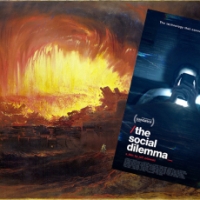The Good Life or “the Goods Life” – The Thought of Lewis Mumford
Possessing tremendous foresight is not always an uplifting attribute. Likewise, a keen sense of hindsight may provide as much of an education in ruins as in woebegone romance. Yet it is precisely by wrestling with the past, engaging with the present, and hypothesizing about the future that a thinker tests their mental mettle against the forces of the world. Such work may be highly iconoclastic and littered with heresies, but engagement is the crucible in which new concepts are crafted, thoughts that linger well past the point when a given thinker’s voice has ceased speaking anew.
The mark of a truly beautiful heretical idea is that it can still prove disquieting decades later. And the works of Lewis Mumford provide a treasure trove of such concepts – ones that have lost none of their ethical strength, humanistic outrage, or hopeful pessimism over the years.
It is not so much that Mumford’s ideas have aged well as that society has advanced rather poorly.
Mumford was born in 1895 and died in 1990 – and the course of his thinking over his ninety-four years was shaped by the tumultuous decades through which he lived. They were decades that saw the world in the throes of ever more destructive tendencies, decades in which humanity repeatedly demonstrated the way in which its incredible creativity and ingenuity could be harnessed for the most wretched of purposes. A highly prolific writer, Mumford produced well over two-dozen books (not including compendiums of correspondence or other collections published posthumously), and hundreds of articles (from 1931 to 1963 he wrote the architecture column “The Sky Line” for The New Yorker) – with his topics ranging from architecture to art to technology to world politics, regional planning, education – it seems that for every topic about which Mumford had an opinion, he wrote something. And Mumford seems to have had an opinion about everything. Mumford’s mammoth tome on the history of cities (aptly titled The City in History) won the National Book Award in 1961, he was presented with the Presidential Medal of Freedom in 1964, and the list of honors and accolades he earned could easily go on.
Nevertheless, the earning of professional prominence did nothing to damper Mumford’s critical eye or his passionate sense of outrage – he was an early voice against nuclear weapons, a tireless critic of the unthinking acceptance of technology, and a constant advocate for putting people ahead of profits. If anything, Mumford’s work grew more radical as he aged and as he witnessed his hopes go awry even as the world seemed to give every one of his fears a try. A comment, delivered while accepting the National Book Award, captures Mumford’s well-intentioned foreboding tone succinctly:
“I would die happy if I knew that on my tombstone could be written these words, ‘This man was an absolute fool. None of the disastrous things that he reluctantly predicted ever came to pass!’ Yes: then I could die happy.” (My Works and Days, 528)
Lewis Mumford was many things, but an “absolute fool” (or even just a “fool”) was not one of them. Though, during his lifetime, Mumford typified that odd (and largely extinct) figure “the public intellectual” – he is today largely an academic footnote, or an individual dredged up for brief consideration before being shoved back onto the dusty bookshelf. It is true that some of the “disastrous things” with which Mumford was so concerned (such as nuclear annihilation) did not come to pass, and yet to consider the scope of Mumford’s work is to see that the threat of nuclear obliteration may have been simply a symptom of another more-subtle if all the more pervasive disaster that he foresaw. Given the size of Mumford’s oeuvre it is dangerously simple to point to particularly prominent works (namely Technics and Civilization and The City and History) and from these parse out his thinking – and while such works are important, they must not be treated in isolation but in the context of his larger intellectual project (in particular Technics and Civilization which is the first part of a four book cycle). For, while many of Mumford’s books remain interesting philosophical/historical investigations the reason why his thinking deserves to be read today is not because of what Mumford can tell us about history, but because of what Mumford can tell us about our current day.
Consider the following words from Mumford’s Program for Survival (1946, reprinted in Values for Survival):
“The piety and superstition that led men once to worship the Golden Calf now leads them to worship the machine. For most Americans, certainly, almost any religious heresy might be uttered without awakening a word of protest, except the heresy that I am now actually uttering—the assertion that the machine is a fetich[sic]: an object of irrational devotion.” (Values for Survival, 84)
Or these words from In the Name of Sanity (1954):
“So, instead of furthering the present processes of automatism, instead of submitting to a love-denying and life-strangling routine, our hope lies in restoring to the very center of the mechanical world the human personality, now lost and bewildered and hungry in the jungle of mechanisms it has created.” (In the Name of Sanity, 114)
While Mumford wrote of cities and technology his concern always circled back to the question of what these cities and technological forms meant for the humans who built them, harnessed them, and were trampled beneath them. Indeed, it may not be too outlandish a claim to suggest that Mumford’s scholarship consists of an elaborate ruse by which he would use the history of technology and commentary on architecture as a way of penning moral philosophy. From his effort to arouse his complacent readers to the dangers of fascism, to the looming threat of nuclear weapons, to the expanding power of technological systems, to the alienating existence of massive cities – Mumford always maintained his focus on the human personality and on the individual human. Beneath all of his work, the primary motif that Mumford returned to repeatedly was that of:
“the fundamental difference between the good life and the ‘goods life.’” (Pentagon of Power, 458)
with Mumford seeing everywhere the signs that the ‘goods life’ was transplanting the “good life.”
Yet, in the midst of our highly technological age, the reason why Mumford’s work can be of so much use is not because he wrote about technology, but because of the way in which he wrote about technology. First and foremost, it should be acknowledged that Mumford did not write exclusively about technology – instead he recognized that technology was but one element of human civilization and could not be treated in isolation from other social, political, and economic matters. Mumford perceived different historic epochs of technological growth and saw in his later years the growth of what he called the “megamachine” wherein powerful technological systems came to dominate every sphere of life – greedily devouring anything that dared to escape its influence and subjecting them to a rigid hierarchy of control. What Mumford warned against was the way in which these forces of technological power were becoming ever more dominant and absorbing ever more aspects of life – such that technology was not actually increasing freedom but was steadily eliminating any alternatives to itself. However it would be the height of irresponsibility and dishonesty to accuse Mumford of being “anti-technology” – for he was acutely aware that there are different technological forms, and some of these are to be preferred over others.
Drawing inspiration from decentralist, regionalist, and anarchist thinkers like Peter Kropotkin, Henry Adams, William Morris, Patrick Geddes and others – Mumford saw the ways in which different technological and societal means produced different ends. For Mumford, given his ethical emphases, this matter of ends was an essential point – as the question of the “good life” was for Mumford the imperative end result. Thus Mumford distinguished between two traditions of technology: “democratic technics” which were small-scale, life-affirming technologies that vested control in the hands of individuals and small communities, vs. “authoritarian technics” that represented massive technological systems wherein:
“Under the pretext of saving labor, the ultimate end of this technics is to displace life, or rather, to transfer the attributes of life to the machine and the mechanical collective, allowing only so much of the organism to remain as may be controlled and manipulated.” (“Authoritarian and Democratic Technics,” 6)
As “authoritarian technics” and the “megamachine” came to dominate, Mumford warned that even the technicians and politicians who claimed to be in control would slowly become impotent in the face of the engine they had started. Technological power would demand ever greater technological power, and those who had never been interested in the value of the individual human personality would be to awestruck by the workings of the machine to even contemplate throwing the brakes on it. As indicated in an earlier quotation – the machine had come to take on godlike proportions and it had assembled a large caste of worshippers and priests who bristled at any whiffs of agnosticism. Matters were further complicated, in Mumford’s analysis, by the way in which “authoritarian technics” managed to secure the loyalty by the bulk of the population – namely through what Mumford termed “the megatechnic bribe” wherein the offer of a share of technological abundance serves to inure people to the negative impacts of technologies, as a result:
“Like those who have become helplessly addicted to cigarettes, they are now so committed to technological ‘progress,’ that they ignore the actual threat to their health, their mental development, or their freedom.” (The Pentagon of Power, 331)
And yet for all of his dire predictions – Mumford did not wallow in despair, but nor for that matter was he willing to advocate for easy fixes. In order for the “good life” to be re-asserted over the “goods life” it would be imperative to recognize how awry things had gone, and to have the ethical fortitude to face these problems as they genuinely presented themselves. Mumford noted that:
“Nothing less than a profound re-orientation of our vaunted technological ‘way of life’ will save this planet from becoming a lifeless desert. And without such a wide-ranging preliminary alteration of personal desires, habits, and ideals the necessary physical measures for mankind’s protection—to say nothing of its further development—cannot conceivably be carried out.” (The Pentagon of Power, 413)
Lewis Mumford died in 1990, but the years since his death have not proved a time in which humanity has recognized the folly of its ways. The threat of nuclear annihilation has receded but the dangers of climate change loom all about us (which are also linked to the unthinking embrace of technology). And even as we hear the siren song sounding in the distance we remain distracted and inured – our allegiance bought off through the “megatechnic bribe” of smart phones, unlimited apps, speedy downloads, and the promises of “wearable technology” and the “Internet of things.” We shudder as we hear that our job might be threatened by automation, and feel discomfort as we learn of the ways that our devices are always spying upon us – yet how often do we pause to truly consider whether we are pursuing the “good life” or the “goods life?”
What the work of Lewis Mumford provides to this day is a way of orienting our present technological predicament in a context that is both ethically and historically grounded, and one which dares to question the technology that exerts an increasing influence over our lives. The concerns that Mumford raised were troubling and heretical in his day – and they are even more so now, as faith in technological progress has become the one true religion of industrialized society. And though the prospect is dark, though the challenges are serious, and though we may well have to accept the renunciation of certain “goods” to attain the “good” – hope remains as long as we hold to our humanity. Thus – as Mumford wrote:
“To avert a tragic end, the human person must come back onto the center of the stage: not as chorus or spectator, but as actor and hero, indeed as dramatist and demi-urge, summoning the forces of life to take part in a new drama.” (Art and Technics, 152)
Which part will you play?
* * *
Looking for a good entry point to the work of Lewis Mumford? It may be tempting to start with his iconic work Technics and Civilization (the new edition of which features an excellent introduction by Langdon Winner) or The City in History – and while both are wonderful books, neither provides a solid “introduction” to the interweaving concerns and ideas that turn up throughout Mumford’s work. Instead – consider starting with Art and Technics, a collection of a series of lectures. In addition to featuring a very strong biographical/intellectual essay by Casey Blake Nelson, Art and Technics consists of an excellent mix of topics and – as the text was originally a lecture – is written in a highly readable (and at moments quite amusing way). Art and Technics provides an excellent distilled version of many of Mumford’s main ideas – and wonderfully mixes his thinking on art, architecture, technology, history, and ethics. It also features two lines that serve as a wonderful aphoristic summation of all of Mumford’s work, namely:
“If you fall in love with a machine there is something wrong with your love-life. If you worship a machine there is something wrong with your religion.” (Art and Technics, 81)
Works Cited
Mumford, Lewis. Values for Survival. Harcourt, Brace and Company, 1939.
Mumford, Lewis. In the Name of Sanity. New York: Harcourt, Brace and Company, 1954.
Mumford, Lewis. “Authoritarian and Democratic Technics.” Technology and Culture. v. 5, no. 1 (Winter, 1964) pp. 1-8.
Mumford, Lewis. The Myth of the Machine, vol. 2: The Pentagon of Power. Harcourt, Brace, Jovanovich, 1970.
Mumford, Lewis. My Works and Days: A Personal Chronicle. Harcourt, Brace, Jovanovich, 1979.
Mumford, Lewis. Art and Technics. Columbia University Press, 2000.
Related Content
Corrupting the “Corruption of Liberalism”
Riddled With Questions – Interrogating Technology
Are We Technologically Literate?
Human Rights and Technological Wrongs












Pingback: Between the Scythe & the Reaper Drone – A review of Nicholas Carr’s “The Glass Cage” | LibrarianShipwreck
Pingback: La Buena Vida o Los Bienes de la Vida-Pensamiento y Vida y de Lewis Munford | blognooficial
Pingback: Looking Up, With Our Feet Still On the Ground | LibrarianShipwreck
Pingback: Resolve to Remember 2014 | LibrarianShipwreck
Pingback: Warding off General Ludd – The Absurdity of “The Luddite Awards” | LibrarianShipwreck
Pingback: Two Years of Steadily Sinking | LibrarianShipwreck
Pingback: A Dark, Warped Reflection – An Analysis of Black Mirror | LibrarianShipwreck
Pingback: Towards a Bright Mountain: Laudato Si’ as Critique of Technology | LibrarianShipwreck
Pingback: Towards a Bright Mountain: Laudato Si’ as Critique of Technology | boundary 2
Pingback: Living in the Exterminable Epoch | LibrarianShipwreck
Pingback: There’s an Apparatus for That | LibrarianShipwreck
Pingback: What Technology Do We Really Need? – A Critique of the 2016 Personal Democracy Forum | LibrarianShipwreck
Pingback: Is Internet access a choice? | LibrarianShipwreck
Pingback: Amazon is hungry for more | LibrarianShipwreck
Pingback: It’s time to fix things – a review of “Move Fast and Break Things” | LibrarianShipwreck
Pingback: The Apocalyptic Turn | LibrarianShipwreck
Pingback: Against the “anti-technology” strawman | LibrarianShipwreck
Pingback: “Atomic warfare means universal extermination” | LibrarianShipwreck
Pingback: Betrayed by the giants | LibrarianShipwreck
Pingback: My Favorite Books from 2017 | LibrarianShipwreck
Pingback: Technological Resolutions for 2018 | LibrarianShipwreck
Pingback: Facebook – to delete, or not to delete? | LibrarianShipwreck
Pingback: Facebook: ¿Borrarse o no borrarse? | No oficial
Pingback: “Why don’t you go live in a cave?” – when technophiles cry troglodyte | LibrarianShipwreck
Pingback: “Cover Your Tracks!” – A Critique of the Privacy Project from The New York Times’ | LibrarianShipwreck
Pingback: In Defense of Jonah | LibrarianShipwreck
Pingback: General Ludd in the Long Seventies – a review of Matt Tierney’s “Dismantlings” | LibrarianShipwreck
Pingback: Authoritarian and Democratic Technics, revisited | LibrarianShipwreck
Pingback: Burn it All – a Review of “Your Computer is on Fire” | LibrarianShipwreck
Pingback: Theses on Techno-Optimism | LibrarianShipwreck
Pingback: The Magnificent Bribe | LibrarianShipwreck